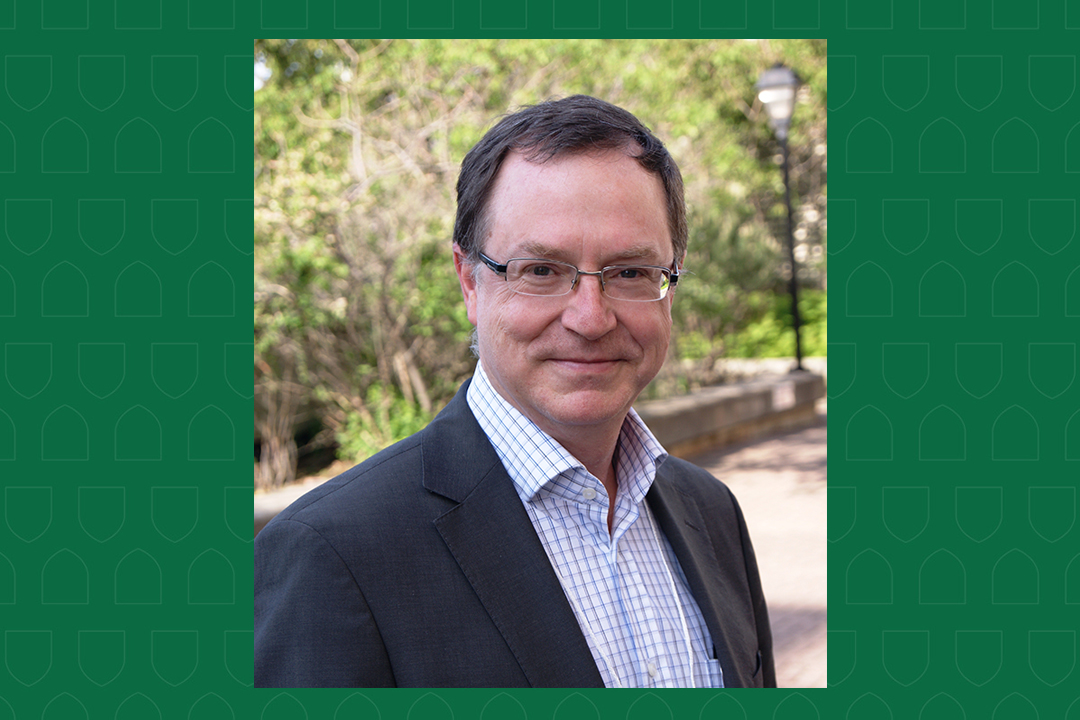
Giving back
Dr. Gary Groot (MD’82, PhD’11) knew early on that he wanted to make a difference in people’s lives. Now, a highly regarded surgical oncologist and researcher, Groot’s work is driving health services research and improving patient care in the province.
By AMANDA WORONIUK“With surgery, you have an opportunity to walk with one person and improve one person’s life; when you improve a system, you improve something for hundreds or thousands of people,” Groot said.
The College of Medicine alumnus wears many hats in his career at the University of Saskatchewan (USask) and within the Saskatchewan health care system.
Groot is the director of surgical oncology at USask; clinical professor of surgery and associate professor in the Department of Community Health and Epidemiology (CH&E); director of research for the General Surgery Residency Training Program and program director for the college’s Clinician Investigator Program. He is also the physician co-lead, Saskatchewan Health Authority (SHA) Clinical Excellence, and has served on various local, provincial and national committees in both cancer care and quality improvement roles.
He is also a health services researcher, with interests focused on Indigenous Health, quality improvement and oncology.
Although he is known for his experience and expertise in his field, Groot did not originally intend to become a surgeon.
“I went into medicine assuming I would be a family physician in a rural context – that was my intent. Then in my final year, I discovered and fell in love with surgery,” said Groot. “During my intern year I transitioned from student to clinician and my interest in surgery deepened as I realized I liked the technical aspect as well as being able to think through a problem, and create a good outcome,” he added. “That attraction grew through my intern year as I prepared myself to go to Africa – which I did for two years.”
Upon completing his medical education, Groot was able to immediately apply his skills. He travelled to Zaire (now the Democratic Republic of Congo), where he was one of two physicians in a city the size of Saskatoon. Groot credits his education with preparing him for this overseas role.
“The College of Medicine training allowed me to do what I did in Africa. There are very few programs that would have provided me the breadth of clinical skills needed,” said Groot. “I could not have done without it. I also give credit to my mentors at St. Paul’s Hospital.”
Groot returned to Canada to complete residency training at USask, before pursuing a surgical oncology fellowship at the University of Manitoba. He returned to Saskatoon in 1991 and has practiced as a surgical oncologist since.
He served for six years as head of surgery for the former Saskatoon Health Region (now the SHA). As Groot was nearing the end of his appointed term, he made the decision to return to the classroom to pursue a PhD degree in the Department of Community Health and Epidemiology.
“I was fortunate to go back and do community health and epidemiology,” said Groot. “I left Africa somewhat disillusioned and feeling like I had failed to make the sort of difference I had set out to make. I am grateful to the professors in CH&E who helped me understand that the system level impact that I struggled to achieve requires the concerted effort of many people moving in the same direction and careful attention to the social determinants of health.”
Groot recalls some of the highlights of his time in the College of Medicine, citing one of his professors as a positive influence. “Dr. Stuart Houston, his commitment to students and ability navigate the system. He was an amazing mentor and professor. I was grateful to know him.”
Inspired by the mentorship received from Dr. Houston, Groot is a mentor now, himself, and considers it a responsibility and privilege.
“Medicine is not a job, it’s a profession. It flourishes when there are strong mentors. I was shaped by mentors. Part of my responsibility is to give back to the next generation. It’s a pleasure to mentor individuals – both current and future colleagues,” he said.
Giving to the college is something that is also close to Groot’s heart. He is an annual contributor to the College of Medicine and is passionate about supporting patient-oriented research. He hopes to inspire others to show their support for the college.
“Part of it is giving back financially, in addition to giving of my time and energy. I choose to donate to causes I care about. I give to the college because I believe that research is an important part of an academic medical college’s contribution to the health and well-being of society. Helping our college become an excellent research facility and fulfill its research mandate is important.”
Groot remains humble when discussing his accomplishments and views giving as an opportunity to show his gratitude.
“I feel that I have been given so much by society and the College of Medicine. It’s an opportunity to give back a little of what have been given to me,” he said. “I accept that I have privilege and believe that with privilege comes responsibility - a responsibility to do my part to improve the system in which we work and move the system towards more equitable and just care thus slowly advancing the medical profession for the next generation.”
This story first appeared in the 2020 edition of Connective Issue.
